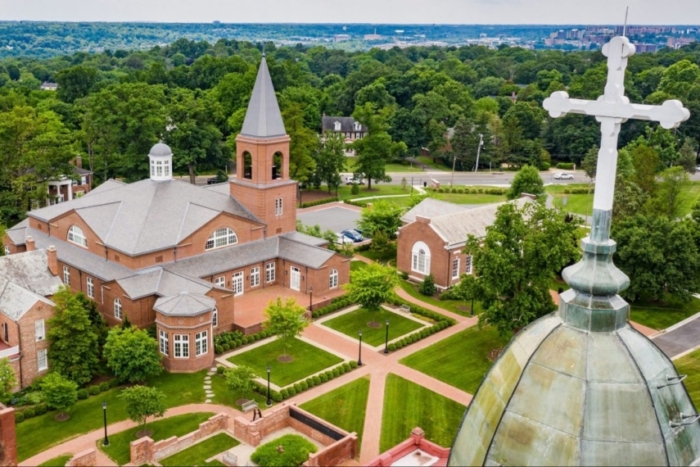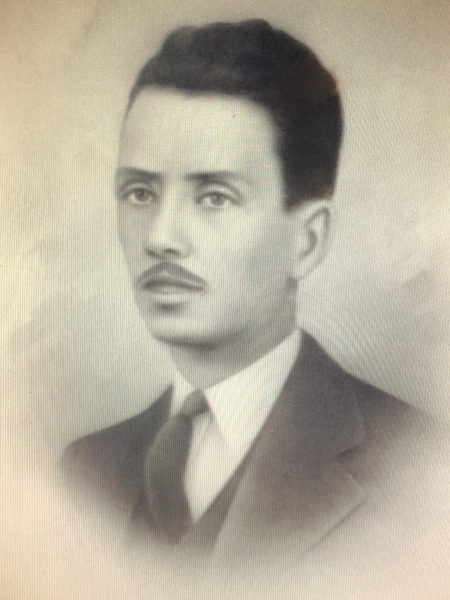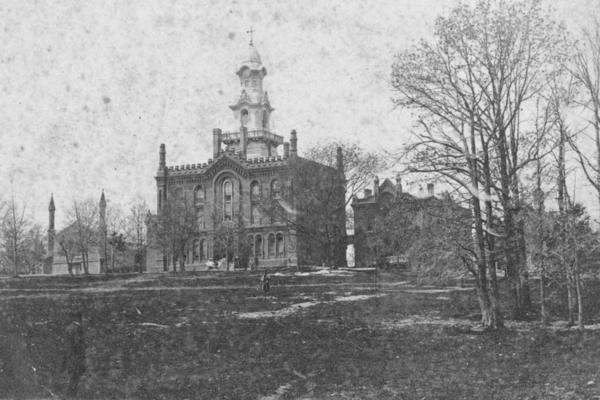VTS reparations fund makes first cash payments to descendants of seminary’s Black slaves, laborersPosted Jul 8, 2021 |
|

Virginia Theological Seminary has identified 32 of the oldest living direct descendants of Black laborers who worked at the seminary during the slavery and Jim Crow eras and has begun making cash payments to them as part of a reparations program. Photo: VTS
[Episcopal News Service] Virginia Theological Seminary has no precise number. By its best estimate, hundreds of Black laborers toiled at the seminary in Alexandria as slaves in the decades before the Civil War and under later forms of economic exploitation in the era of Jim Crow segregation.
In 2019, nearly two centuries after its founding, the Episcopal seminary announced that it planned to repay the debt it owed those past laborers by creating a $1.7 million reparations fund. It launched an effort to identify their oldest living direct descendants, and in February 2021, it began issuing cash payments to eligible relatives, whom it calls “shareholders.” The initial payments are about $2,100 each, and shareholders are offered access to on-campus amenities that were off-limits to their ancestors.

John Samuel Thomas worked at Virginia Theological Seminary in the first half of the 20th century. Photo courtesy of Linda Thomas
“It’s just unbelievable,” the Rev. Linda Thomas, a Baptist pastor in Maryland, told Episcopal News Service. Her grandfather, John Samuel Thomas, worked at VTS as a general laborer and janitor in the first half of the 20th century, and she and her two sisters are among the first shareholders to receive reparations payments from VTS.
The VTS program is getting off the ground at a time when other American academic institutions, as well as Episcopal dioceses and the federal government, are considering various forms of reparations for their historic complicity in racist systems. The seminary, founded in 1823, was considered a trailblazer when it first announced its reparations fund. Now it is said to be one of the first American institutions making direct cash payments to the descendants of Black people who were exploited for their labor.
Some families whose ancestors worked at the seminary have welcomed the payments, saying the seminary’s acknowledgment is long overdue. Others say the modest monetary gesture is too little and too late. “It’s a measly amount for the injustices our elders suffered, but for many families, it’s a significant payout as they continue to cope with a legacy of huge racial wealth inequities,” Judy Belk wrote in the Los Angeles Times. She is an Alexandria native whose relatives are among the earlier generations of Black workers at VTS.
Thomas sees it as a positive step in the broader push to confront the historic roots of racial injustice. “When you look at the word ‘reparation,’ it’s the making of amends. It’s to put right a wrong that was done. Isn’t that what the Lord has done for us?” Thomas said. She is one of 32 shareholders that VTS has identified so far. “I know that this is the beginning. I pray for a much larger focus in terms of making amends for the atrocity of slavery.”
Ebonee Davis, who administers the VTS reparations program, interviews the shareholders and their relatives in the process of confirming their genealogy, recording their family stories and finalizing plans for the payments. She told ENS she respects their varying views of the reparations, from appreciation to skepticism. Their conversations are personal and go well beyond financial considerations.
“This money, even if it was millions of dollars, cannot change the past,” Davis said. “The primary goal is to build a new relationship with the local Black community in Alexandria, and that’s why it is such a personal process.”
VTS was founded in 1823, and at least one building, Aspinwall Hall in 1841, was built with slave labor. Three of the four founding faculty were slaveowners, Davis said, and in the early years, white students were permitted to bring enslaved people on campus as servants. Those Black laborers were denied access to dining halls and other campus facilities when not working, and such conditions continued under Reconstruction and segregation, Davis said. Black students also were excluded from attending the seminary until the 1950s.

Aspinwall Hall, now used as an administrative building at Virginia Theological Seminary, was at least partly built with slave labor. Photo: Mathew Brady, via Library of Congress
In September 2019, VTS announced its reparations fund, committing the money broadly to a variety of racial reconciliation goals, including helping local Black congregations meet community needs, supporting Black alums, encouraging more Black clergy in The Episcopal Church and promoting social justice. Since then, VTS has used separate funds to support those other goals, and the reparations fund will be used solely to make annual payments to the shareholders in perpetuity.
“The argument, in my view, is simple: labor should be compensated,” the Very Rev. Ian Markham, the seminary’s dean, said in a written statement to ENS. “People who were not compensated, or were undercompensated, were deprived of the opportunity to choose how to use the fruit of their labors. They could neither spend during their lifetimes nor make provision for their descendants.”
VTS doesn’t expect the payments will fully compensate families for its “heinous sins,” Markham said, but the seminary stands by the principle that cash reparations are an appropriate response to a historic injustice.
Available proceeds from the endowment are calculated annually for distribution during the fiscal year, which starts July 1, and the seminary divides that amount by the number of shareholders. In the first round of distributions, 16 shareholders had received the payments by the end of June. Checks are due for distribution to two more shareholders on July 8. Future payments will fluctuate as more shareholders are added and new contributions are made to the endowment.
“This represents the fact that finally, finally, someone is willing to recognize what we did back in the day, back in the Civil War and after the Civil War,” Frances Terrell, a 78-year-old shareholder whose grandparents worked at the seminary in the 1920s, told the Alexandria Times. “It’s wonderful that they are respecting us enough to want to recognize us.”
For decades, The Episcopal Church, too, has emphasized fighting racism and fostering racial reconciliation while shining a light on the church’s own past involvement with slavery and segregation. Last month it announced the formation of a churchwide truth and reconciliation working group. In 2006, General Convention passed a resolution supporting federal legislation that would confront the country’s legacy of slavery and take a step toward “monetary and non-monetary reparations to the descendants of the victims of slavery.”
In April, a U.S. House of Representatives committee endorsed a plan to create a commission to research and consider federal reparations for slavery, though the measure faces dim prospects of clearing both the House and the Senate.
Davis joined the seminary four years ago as an archivist for its African American Episcopal Historical Collection. In January 2021, she took on the new role of associate for programming and historical research for reparations, which entails coordinating the reparations research team and working with the families.
So far, they’ve only confirmed shareholders on the Jim Crow side of the research. For the ancestors who worked at the seminary during those years, “we had the benefit of living memory,” Davis said. Many of these first shareholders are from families whose connections to VTS are well known in the Alexandria community.
“There are sad stories, but there are really heartwarming stories,” Davis said. She and her team sometimes present genealogical findings that weren’t previously known to the families, though the stories belong to the families, who already feel connected to those who have gone before. “There’s a pride there that I don’t want to be understated.”
The 32 initial shareholders come from six families that trace their ancestry to Black laborers at the seminary. One family has 12 shareholders. The descendants are invited to meet with Markham to discuss the goals of the reparations program. Before receiving the payments, they sign letters of agreement confirming how they wish the money to be distributed, including to their beneficiaries after their deaths.
The cash payments aren’t life-changing amounts, and VTS doesn’t force them on anyone who is reluctant to participate, Davis said. It has been an exciting process, though, for some of the families, she said. Shareholders can get their own VTS ID cards, allowing them on-campus access equivalent to that of retired faculty. They can eat for free at the dining facilities, borrow library books and attend seminary events and programs. One of the shareholders, Gerald Wanzer, celebrated his 77th birthday at the seminary in March.
Identifying the descendants of enslaved laborers will require more extensive research. “We have found 20 or so names of people who were enslaved or were free Black people who worked at the seminary during the antebellum period. We just haven’t connected with any of their descendants yet,” Davis said.
Thomas, the shareholder in Maryland, hasn’t yet requested a campus ID card, though she chose to meet with Markham and is considering an offer to attend a doctoral program at the seminary free of charge. She tells the story of her grandfather’s desire to be a minister and how seminarians would lend him their books, but he wasn’t able to attend VTS himself. He only became a Baptist pastor after leaving VTS and moving to Washington, D.C.
“There’s no amount of money that could pay for the suffering that people have encountered,” Thomas said, but she is pleased to see an institution like VTS is choosing to “put money where their mouth is.”
Thomas is personally grateful for the “small” payments. She is putting them in an account to help support the education of her family’s youngest generation, her two grandsons.
– David Paulsen is an editor and reporter for Episcopal News Service. He can be reached at dpaulsen@episcopalchurch.org.

Social Menu